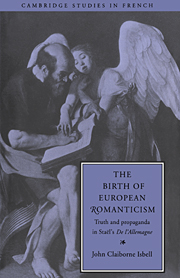Book contents
- Frontmatter
- Contents
- Acknowledgements
- List of abbreviations
- Author's note
- Introduction
- 1 Birth of a nation – Staël's Romantic Germany in 1810
- 2 Romantic literature and politics
- 3 Philosophy and ethics in Napoleonic Europe
- 4 Religion, love, enthusiasm – a new Enlightenment
- Conclusion
- Appendix: De l'Allemagne titles and dates
- Notes
- Bibliography
- Index
- Cambridge Studies in French
3 - Philosophy and ethics in Napoleonic Europe
Published online by Cambridge University Press: 23 September 2009
- Frontmatter
- Contents
- Acknowledgements
- List of abbreviations
- Author's note
- Introduction
- 1 Birth of a nation – Staël's Romantic Germany in 1810
- 2 Romantic literature and politics
- 3 Philosophy and ethics in Napoleonic Europe
- 4 Religion, love, enthusiasm – a new Enlightenment
- Conclusion
- Appendix: De l'Allemagne titles and dates
- Notes
- Bibliography
- Index
- Cambridge Studies in French
Summary
Parmi les divers développements de l'esprit humain, c'est la littérature philosophique […] que je considère comme la véritable garantie de la liberté […] Les géomètres, les physiciens, les peintres et les poètes recevraient des encouragements sous le règne des rois tout-puissants, tandis que la philosophie politique et religieuse paraîtrait à de tels maîtres la plus redoutable des insurrections.
(De la littérature, 32–3)Nous en sommes à cette époque de la civilisation où toutes les belles choses de l'âme tombent en poussière.
(IV 394/7)This chapter looks at Staël's treatment of the German thinkers she refers to. Two questions arise: is Staël faithful to her sources, and does she have ideas of her own? I argue that Staël constructed the basic framework of her thought long before her first German tour in 1803; that this framework shared key points with the Germans she names; and consequently, that most of her ‘Romantic’ system in 1810 can be traced with equal accuracy to the Germans or to herself. What is new in De l'Allemagne is Staël's fusion of her very diverse sources into a coherent whole. Local distortion will be an inevitable side-effect of this process. Synthesis and distortion go hand in hand.
De l'Allemagne's 21-chapter third Partie, ‘La philosophie et la morale’, has two chapters on German philosophers. Schelling gets no chapter, despite a monograph on Staël's alleged debt to him. Nor do other Romantics; nor does Fichte. The Schlegels are classed as literary critics.
- Type
- Chapter
- Information
- The Birth of European RomanticismTruth and Propaganda in Staël's 'De l'Allemagne', 1810–1813, pp. 108 - 164Publisher: Cambridge University PressPrint publication year: 1994

